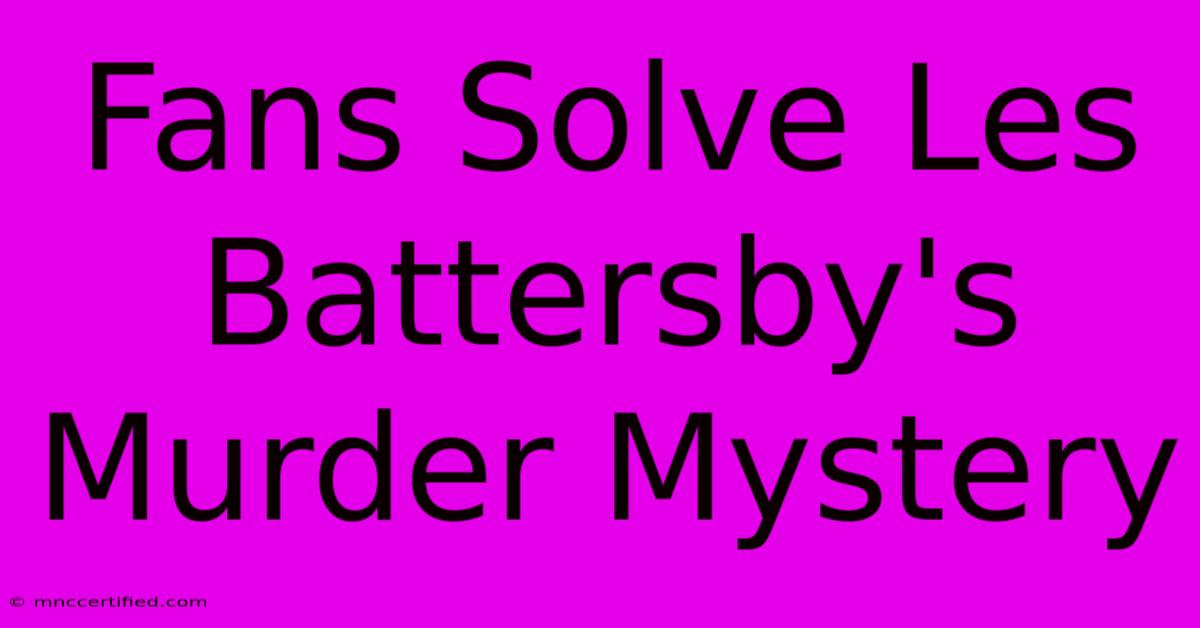Fans Solve Les Battersby's Murder Mystery

Table of Contents
Fans Solve Les Battersby's Murder Mystery: A Triumph of Online Deduction
The death of Les Battersby, a beloved (and sometimes infuriating) character in the long-running British soap opera Coronation Street, sent shockwaves through the nation. His demise wasn't just a plot point; it became a massive, interactive online mystery that saw fans, armed with their keen observational skills and encyclopedic knowledge of Weatherfield's intricate history, unravel the truth before the show itself revealed all. This article explores how dedicated fans cracked the case, showcasing the power of collective online sleuthing and the enduring appeal of participatory television.
The Clues and the Conspiracy Theories: A Nation Obsessed
Les Battersby's death was shrouded in ambiguity. The initial scenes provided tantalizing glimpses – a cryptic note, a suspicious figure lurking in the shadows, and a seemingly accidental fall. But these were far from definitive. This lack of clear-cut answers ignited a firestorm of speculation on social media platforms like Twitter, Facebook, and Reddit. Dedicated fan forums became hubs of intense discussion, transforming into virtual detective agencies.
The Power of Online Collaboration
What set this particular fan investigation apart was the sheer scale of collaboration. Fans weren't just individually theorizing; they were actively sharing evidence, comparing notes, and cross-referencing information. This collaborative approach allowed for a level of analysis far exceeding what any single individual could achieve. Specific details, initially overlooked by casual viewers, were highlighted and meticulously examined. Images from episodes were dissected frame-by-frame, searching for overlooked clues. Past storylines were revisited to uncover potential motives and connections.
The Key Breakthroughs: Unraveling the Mystery
Several key breakthroughs propelled the fan investigation forward. One particularly insightful fan noticed a subtle change in the lighting during a crucial scene, suggesting a possible alteration in the original footage. Others painstakingly compiled a timeline of events, identifying inconsistencies and potential red herrings. This meticulous process, fueled by countless hours of dedicated analysis and discussion, allowed the fans to identify a strong suspect, long before the reveal on the show.
The Importance of Specificity and Detail
The success of the fan investigation wasn't just about speculation; it was about the rigorous examination of specific details. Fans meticulously documented their findings, providing evidence and reasoning for their conclusions. This level of detail was crucial in convincing others and building consensus within the online community. It highlighted the importance of evidence-based reasoning, even in the context of fictional narratives.
The Show's Response: A Testament to Fan Engagement
The show's writers and producers acknowledged the fans' impressive work, highlighting their dedication and sharp observation skills. This acknowledgement showcased the power of fan engagement and the potential for viewers to become active participants in the narrative. While the show ultimately revealed its intended storyline, it acknowledged the significant contribution fans made to the overall experience.
The Legacy of Les Battersby's Murder: Fans as Co-creators
Les Battersby's death was more than just a plot point; it was a testament to the power of collective online sleuthing and the enduring connection between fans and their favorite shows. It demonstrates that viewers are not merely passive recipients of content but can actively contribute to, and shape, the narrative experience. This participatory aspect significantly enriches the viewing experience, creating a dynamic feedback loop between creators and audience. The success of the fan investigation in solving Les Battersby's murder remains a compelling example of fan engagement at its finest and serves as a powerful case study in the collaborative nature of online communities. The legacy of Les Battersby's murder mystery underscores the evolving relationship between television and its audience in the digital age.

Thank you for visiting our website wich cover about Fans Solve Les Battersby's Murder Mystery. We hope the information provided has been useful to you. Feel free to contact us if you have any questions or need further assistance. See you next time and dont miss to bookmark.
Featured Posts
-
Les Battersby Death Coronation Street Killer Revealed
Nov 30, 2024
-
November 29th Plot Picks
Nov 30, 2024
-
Savannah Bond Manuel Ferrara
Nov 30, 2024
-
Game Recap Boise St 34 Oregon St 18
Nov 30, 2024
-
Affleck And Garners Thanksgiving
Nov 30, 2024